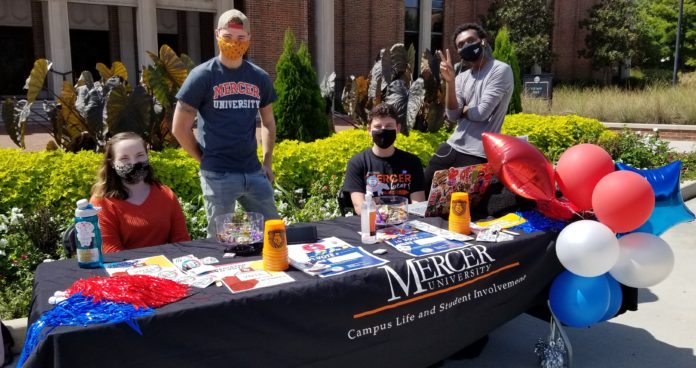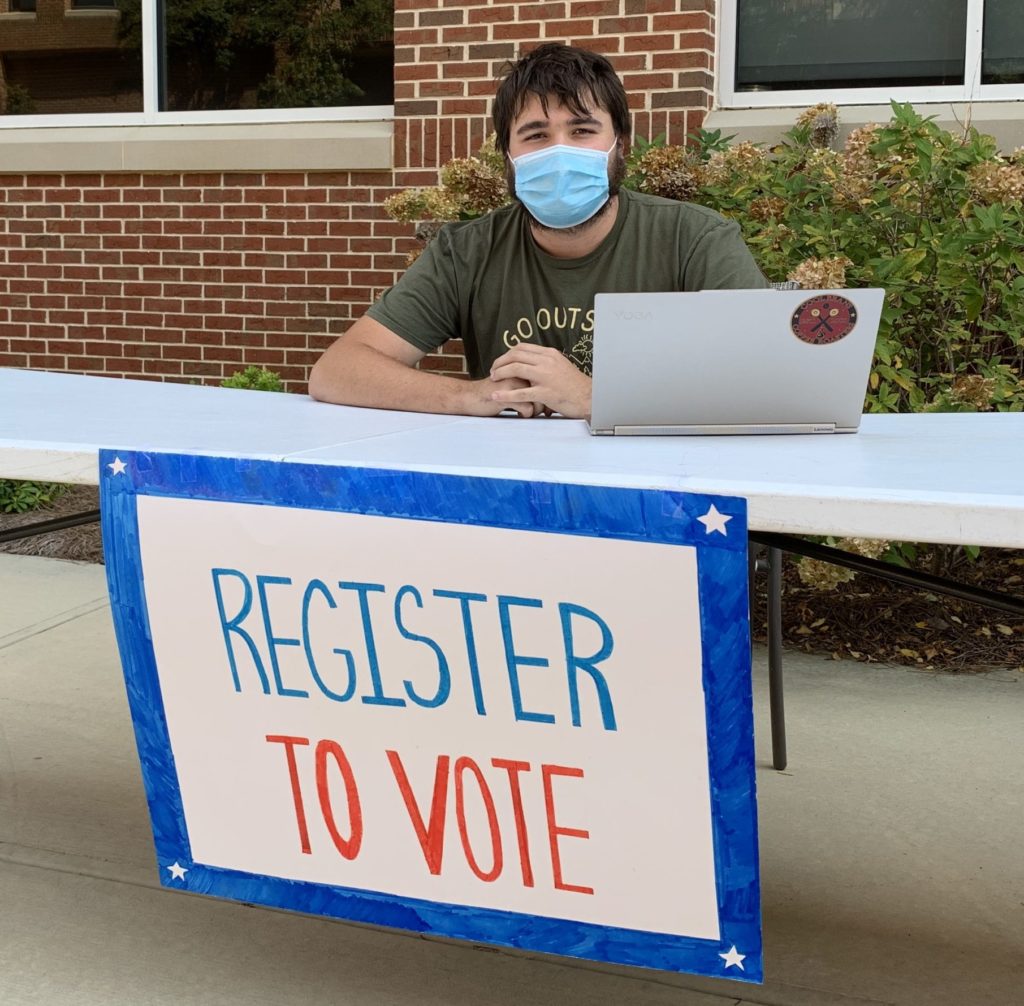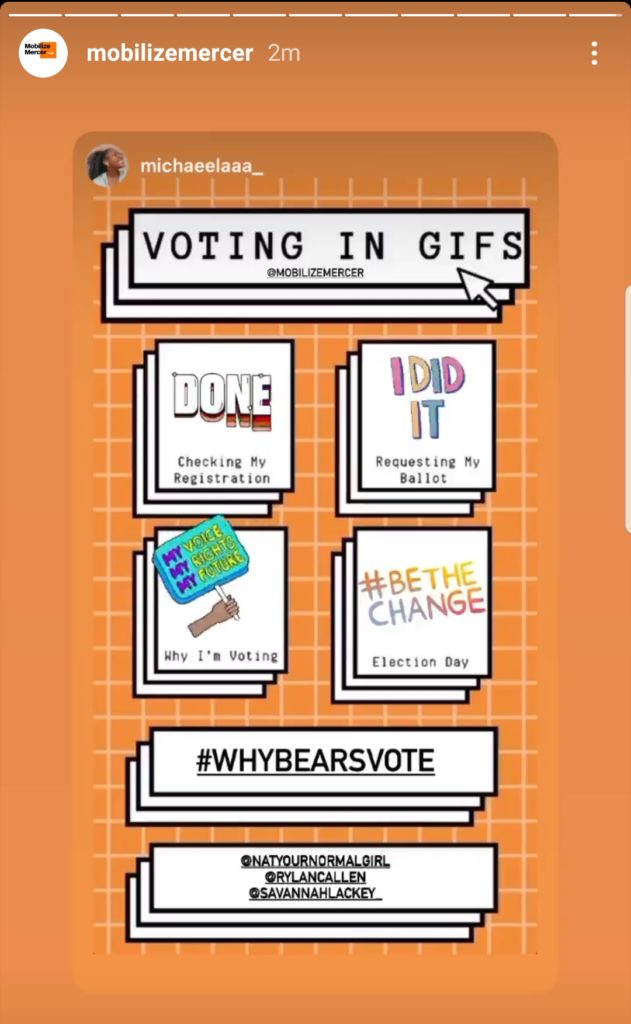
This semester, Mercer University political science students have been helping their peers register to vote and understand why their vote matters.
Dr. Chris Grant, professor and chairman of the Political Science Department, has been teaching his “Campaigns and Elections” course in alignment with the election cycle since 1996. He added a service-learning component to the course in 2010, but this semester he partnered with Lauren Shinholster, coordinator of community engagement, for course elements related to voter engagement.
Political science students have worked with Shinholster and the Mobilize Mercer voting initiative before, but Dr. Grant and Shinholster opted for a more formal partnership this year, Shinholster said.

“That was born out of needing to do something to address how the pandemic has affected the election. I didn’t have the capacity to do that by myself,” Shinholster said. “The collaboration was necessary, but it has been so helpful in ways that I didn’t expect because of the energy his class has as well as their experience.”
Each student committed to working a voter registration table and delivered a 15-minute presentation about voting to a UNV 101 freshman class earlier this semester. The Mercer student body does really well when it comes to registering to vote but not as well on actually casting their ballots, Shinholster said. Only 60% of students who register turn out to vote, a gap that Shinholster and Dr. Grant are addressing through their partnership.
In addition, students sometimes aren’t aware of their options or the deadlines tied to voter registration and absentee ballots. During the UNV 101 presentations, the political science students made sure their audience understood the process and had an action plan for when, where and how to vote.
“Most of our students have every intention to vote, but life just gets in the way, and suddenly voting isn’t a huge priority,” Shinholster said.

The political science students are required to log at least 20 service hours and are working on specific projects in groups. One group focused on initiatives for National Voter Registration Day on Sept. 22. They set up tables on Cruz Plaza to help students register to vote, check their voter registration status and request absentee ballots and also implemented a “Why Bears Vote” social media campaign.
Two separate groups are focusing on increasing voter turnout for STEM (science, technology, engineering and math) majors and student athletes. The latter group connected with sports teams on campus and polled them on their registration status and voting plans.
“We’re really focusing on those subcategories, so we can get as many students registered and knowledgeable as possible,” said Allison Ruiz, a junior political science major who is in the STEM group.
STEM majors have the lowest voter turn out among all majors, so Ruiz and her group set up voter registration tables outside the Godsey Science Center and are planning other events to get these students engaged.
“In the past, we’ve had problems with signing young people up because they feel like their voice doesn’t matter,” she said. “It’s crazy to see the demographic change in this election because we have just as much of a say as anyone else, which is really powerful to tell people when they’re registering to vote.”
Two other groups are campaigning for Democratic and Republican candidates by making phone calls, writing letters, knocking on doors and more. These groups partnered with the Young Democrats and College Republican student groups, Mobilize Mercer and the Department of Political Science to host debate watch parties on Cruz Plaza on Sept. 29 and Oct. 7.
“The idea for the watch party started when we were thinking of different ways to engage the community and get people excited about the election,” said Harrison Ivins, a junior double-majoring in political science and secondary education, vice president of the Young Democrats and part of the class group focusing on Democratic campaigns. “Everyone had a lot of fun. It was a really good, positive environment, and I don’t think it had a lot of the tension that typically comes with the political culture.”
Dr. Grant hopes his course will give students an understanding of what goes on in campaigns, an appreciation of the political process and a respect for campaigns that are on “the other side” of their political views. He wants them to feel fully confident, whether they choose to go into a political career, pursue work as an activist or just become regular voters.
“If you want to advocate for change, the political system is the most potent actor,” Dr. Grant said. “2020 is a year when voters under 30 will likely decide many races from the presidency down to the General Assembly. I cannot remember an election in recent years where the influence of younger voters will be more determinative of the country’s future direction. If younger voters turnout in large numbers, results on election night (or the weeks after) will be surprising to many.”
Dr. Grant’s class and Mercer’s voter engagement initiatives help students realize that the election is about more than just the presidential race, Shinholster said. There’s a lot on the ballot and a lot at stake, and voting is a habit that students need to form now.
“They have a great opportunity to impact this election,” she said. “There are a lot of eyes on our students to go out and affect change. We want to raise awareness that they have a lot of power.”









